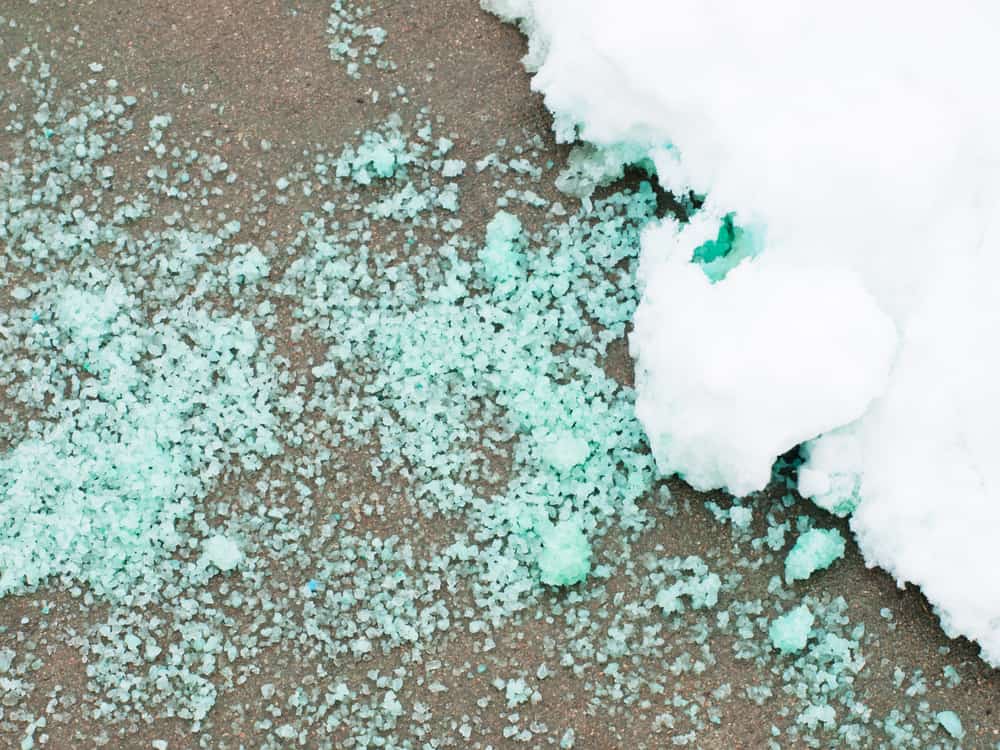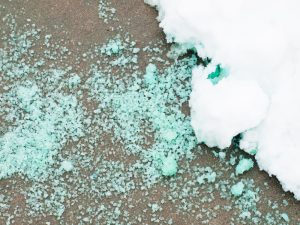“Oh the weather outside is frightful!” Ok, so it may not be quite frightful yet, but when the first sign of snow and ice hits, it might be. We’re all aware, or should be aware, that salt can help de-ice our driveways, sidewalks, and streets to help us move safely along in the wintertime. However, did you know de-icers will damage concrete? Also, did you know that some de-icers are more appropriate for your needs than others? Don’t worry! We’re here to give you all the information you need so you can keep your driveways/sidewalks/walkways, your family, and yourself safe this winter.
The first winter, for new concrete, salt should never be used. If it’s necessary, sand can be used to increase traction. After the first year concrete has been laid, if you absolutely must put salt down, certain de-icers will create moderate or minimal damage to your concrete. Here is a list of best salts and ice melts to use, depending on your situation.
Calcium Chloride – Primary de-icing salt
- Can be used for both residential and commercial properties
- Comes in form of rounded white pellets
- May cause skin irritation if handled with moist hands
- Creates minimal to moderate damage to asphalt or concrete
- Effective temperature is -25 degrees Fahrenheit
- Fast acting and more effective than sodium chloride
- Can damage grass and plants if overapplied
- Best for people with little time
Calcium Magnesium Acetate –
- Can be used for parking garages and airports
- Creates moderate damage to asphalt or concrete
- Effective temperature is 20 degrees Fahrenheit
- Less corrosive than chloride products and is environmentally friendly
- Product best for contractors
Magnesium Chloride – Primary de-icing salt
- Can be used for both residential and commercial properties
- Newest de-icing salt; best choice for melting ice
- Creates moderate to significant damage to asphalt or concrete
- Effective temperature is -13 degrees Fahrenheit
- More effective than sodium, safer around pets, and environmentally friendly
- If overapplied, can damage plants, and is lethal to pets suffering kidney disease
- Perfect for pet owners, gardeners, and those in a rush
Potassium chloride – Primary de-icing salt
- Can be used for residential properties, especially pet-friendly homes
- Not a skin irritant; overall good choice
- Creates minimal to moderate damage to asphalt or concrete
- Effective temperature is 25 degrees Fahrenheit
- Can melt ice at lower temperatures when combined with other chemicals
- Safer option for pet owners and environmentally friendly
- Damages grass and plants when over applied, lethal for pets with kidney disease
Sodium chloride/rock salt – Primary de-icing salt
- Most common de-icer
- Releases highest amount of chloride when it dissolves
- Can be used for both residential and commercial properties
- Creates minimal to moderate damage to asphalt or concrete
- Effective temperature is 20 degrees Fahrenheit
- Inexpensive option, perfect for bargain hunters
- Can be damaging to asphalt, concrete, brick, stone, metal, grass, plants, and wood decks. Not to be used on concrete less than 1 year old and lethal to pets if ingested.
Urea/carbonyl diamide –
- Can be used for residential properties, especially for those with pets
- Creates minimal damage to asphalt and concrete
- Effective temperature is 10 degrees Fahrenheit, but better at 25 to 30 degrees Fahrenheit
- Safer for pets and environmentally friendly
- Can be damaging to plants if over applied and not very effective as a de-icer
- Perfect for pet owners or gardeners
If you have pets and/or young children, read warning labels before you bring home, and always keep these out of the reach of young children or out of your pet’s’ way. Your goal is to de-ice, but if your children or pets get into some of these types of salts, it could put them in severe danger. Before applying anything to melt the ice, get rid of any snow first using a shovel or snow blower/snow plow. Always use common sense when you’re in contact with any of these chemicals because they could damage your health or overall well-being as well if you don’t know how to handle them.




